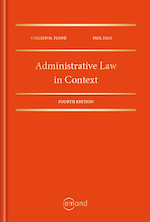Big Bang Theory: Vavilov’s New Framework for Substantive Review

I have uploaded a pre-publication version of “Big Bang Theory: Vavilov’s New Framework for Substantive Review“, my chapter in Flood & Daly eds., Administrative Law in Context (4th ed., Emond Montgomery, 2021):
This Chapter sets out the new administrative law framework the Supreme Court of Canada established in Vavilov. The decision in Vavilov was the ‘big bang’ of Canadian administrative law: from now on, every issue must be analyzed with Vavilov as the starting point, with prior jurisprudence playing a supporting role only to the extent it can fit within the Vavilov framework.
There had been widespread discontent with the Supreme Court of Canada’s development of administrative law in the previous decade. Sitting and retired judges, practicing lawyers and academics contributed to a 2018 symposium bemoaning the current state of the law. In particular, these members of the bench, bar and academy complained that the Supreme Court’s framework for selecting the “standard of review” – correctness or reasonableness – was unclear and that the Supreme Court had never explained how to conduct reasonableness review. In Vavilov, the Supreme Court set out to respond to these complaints.
There are two main components to the Vavilov framework: the reasonableness standard; and the rules for selecting the standard of review. Before Vavilov, there was Dunsmuir v. New Brunswick. Designed to simply synthesize the Supreme Court’s context-sensitive application of the so-called ‘pragmatic and functional analysis’, Dunsmuir soon hardened into a set of categories of decision to which correctness and reasonableness would apply before, eventually, becoming a virtually irrebuttable presumption of reasonableness review. With the presumption of reasonableness review difficult to escape, defining “reasonableness” became ever-more important; the two paragraphs devoted to the task in Dunsmuir were inadequate.
In this Chapter, the reasonableness standard is discussed first, the selection of the standard of review second, because some of the issues relating to the selection of the standard of review cannot be adequately understood without prior knowledge of the content of the reasonableness standard. Moreover, reasonableness is the presumptive standard of review, subject to exceptions based on “institutional design” and the “rule of law”, so it makes sense to begin with explaining its content.
The last issue addressed in this Chapter is remedial discretion, a subsidiary part of the Vavilov framework but one which, nonetheless, is likely to be significant in many cases. Scattered through this Chapter are some ‘deep dives’ into cases which reveal significant features of Vavilovian administrative law.
Download it here.
This content has been updated on November 18, 2021 at 16:09.